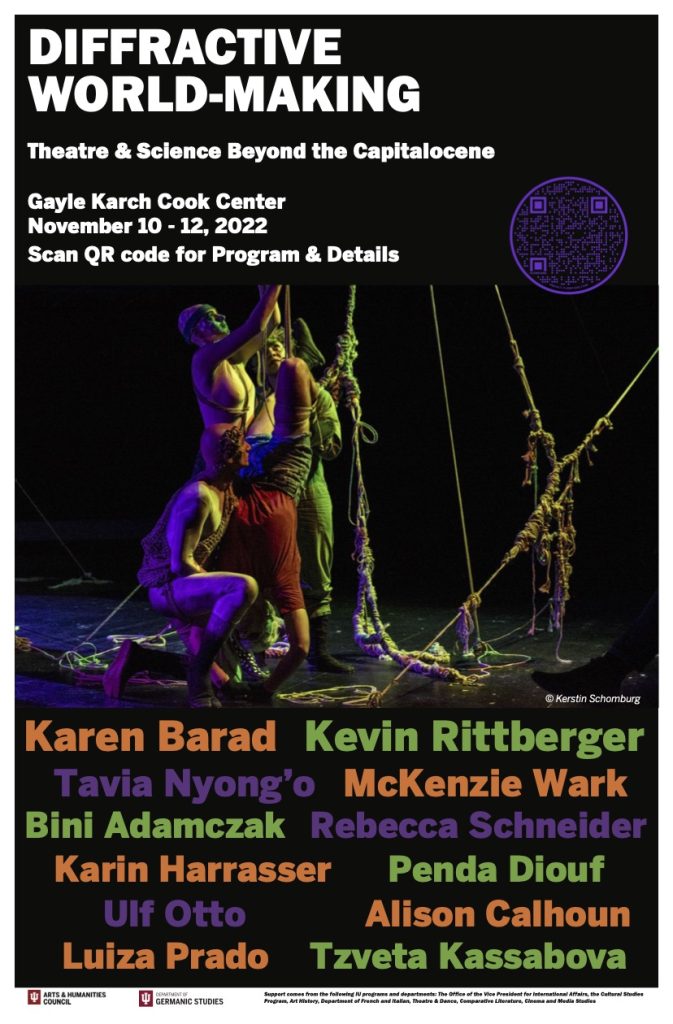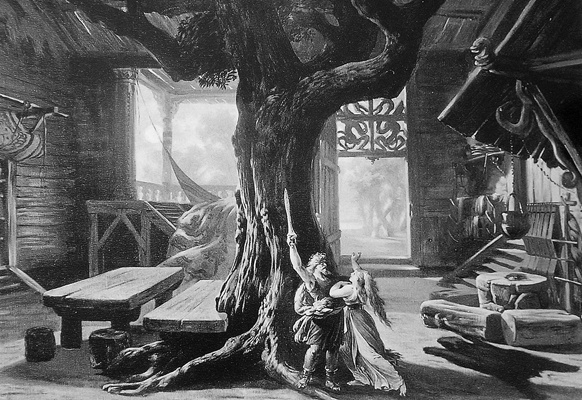
Diffractive World-Making: Theatre & Science Beyond the Capitalocene
Indiana University Bloomington, Cook Center
November 10-12, 2022
Conference Organizers: Teresa Kovacs & Kevin Rittberger
Diffractive World-Making: Theatre & Science Beyond the Capitalocene starts from the smallest possible constellation: one playwright, one philosopher. Berlin-based playwright Kevin Rittberger meets feminist and philosopher of science Karen Barad. On the basis of Barad’s book Meeting the Universe Halfway: Quantum Physics and the Entanglement of Matter and Meaning and subsequent works, Rittberger explores the potential of a ‘diffractive theatre’ for our technoscientific age. At the same time, Barad explores our ‘troubled time/s’ and offers a queer, postcolonial critique that gives the impulse for our discussions on aesthetics and ethics. The initial encounter provides an opening through which to engage with concepts like response-ability and multi-species aesthetics, as well as with issues like colonialism, shrinking population, reproductive justice, and a critical theory for a damaged planet.
The conference itself takes up Barad’s method of diffraction and expands to an exceptional international cast of leading critics, artists, and theorists that think-with and nearby Barad and Rittberger, including McKenzie Wark, Rebecca Schneider, Tavia Nyong’o, Karin Harrasser, Ulf Otto, Bini Adamczak, Alison Calhoun, Penda Diouf, Luiza Prado, and Tzveta Kassabova.
Aim is not just to shed light on the entanglement of the sciences and aesthetics, but to demonstrate how productive it can be to read them through each other. In so doing, we can investigate their potential to radically rework established Western concepts and categories of causality, time, and space, and contribute to rethinking the troubled times in which we live.
Conference Program
THURSDAY, NOVEMBER 10, 2022
Cook Center, IU Bloomington
5-8pm
Introduction by the conference organizers Teresa Kovacs and Kevin Rittberger
Entangled Lecture
Karen Barad:
Troubling Time/s. Undoing the Future.
Kevin Rittberger:
breaking through the fourth, fifth, sixth wall…? on diffractive theatre
Reception
FRIDAY, NOVEMBER 11, 2022
Cook Center, IU Bloomington
10am-12pm
Talk
Rebecca Schneider:
Gesture, Redaction, Diffraction, and Flight: Arts of the Interstice
Dialogue
Alison Calhoun and Ulf Otto:
Rethinking Theater and Technology: Early, Late and Never Have Been Moderns
1-3pm
Talk (via zoom)
Bini Adamczak:
Fractional Relationality
Talk
Tavia Nyong’o:
Relationality? No Thanks! On Black Performance and its Critical Refusal
3.15-5.15pm
Reading
Penda Diouf:
colonial stories: from France to Namibia. Read by Eboni Edwards
Talk
McKenzie Wark:
Dysphoric Planet
6.30pm
FAR Arts Center
Dance
Tzveta Kassabova:
Prometheus. Beginnings. Based on plays by Kevin Rittberger
SATURDAY, NOVEMBER 12, 2022
Cook Center, IU Bloomington
10am-12pm
Talk
Karin Harrasser:
Violence and the Care for Images: Doing History with Strangers
Conversation
Art and Agency: On Mind, Matter, and Media
with Karen Barad, Karin Harrasser, Tavia Nyong’o, McKenzie Wark moderated by Rebekah Sheldon
1–3pm
Reading and Workshop:
Penda Diouf, Kevin Rittberger:
„Blackout White Noise.“ On ‘ethico-onto-epistem-ological’ writing
Talk
Luiza Prado:
WAVES/WEEDS/WORLDS
4pm
Performance
Luiza Prado:
The Sermon of the Weeds
This conference is supported by the following Indiana University’s departments and programs: Germanic Studies, Presidential Arts and Humanities Program, The Office of the Vice President for International Affairs, the Cultural Studies Program, Art History, French and Italian, Theatre & Dance, Comparative Literature, Cinema and Media Studies
This conference is held in person. However, we are happy to share a zoom link with those who cannot travel to Bloomington but would still like to attend the conference. To receive a link and for any other information regarding the conference, please contact Teresa Kovacs (tekovacs@iu.edu)
 While historically informed performance practice is now widely accepted in early music and beyond, the idea of scientifically informed interpretation hardly plays a role in theater. The medium is too ephemeral by design, too time-specific, and too difficult to reconstruct. The audience of today would receive a (in practice impossible) historically accurate performance differently than the audience of the first performance. The parameters of the bodily co-presence of performers and spectators and the continuous feedback loop associated with it would thus be constituted fundamentally differently.
While historically informed performance practice is now widely accepted in early music and beyond, the idea of scientifically informed interpretation hardly plays a role in theater. The medium is too ephemeral by design, too time-specific, and too difficult to reconstruct. The audience of today would receive a (in practice impossible) historically accurate performance differently than the audience of the first performance. The parameters of the bodily co-presence of performers and spectators and the continuous feedback loop associated with it would thus be constituted fundamentally differently.